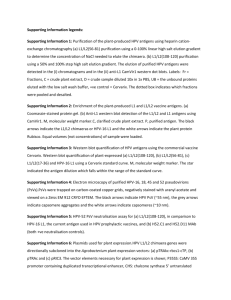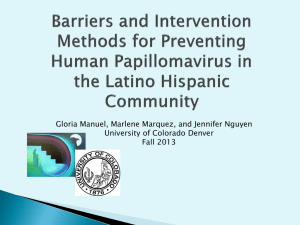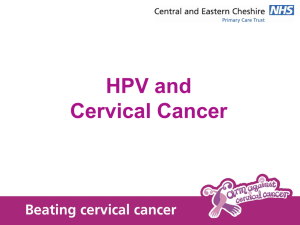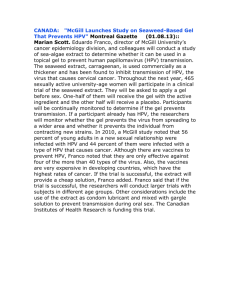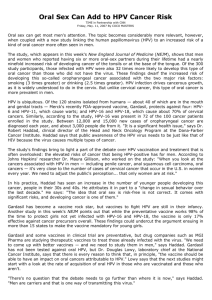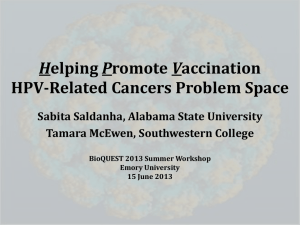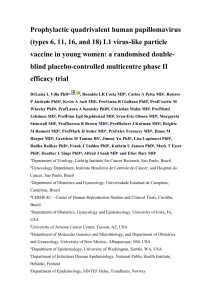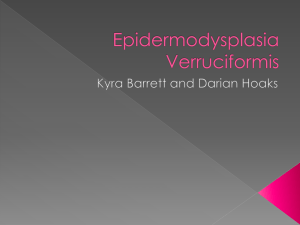Varicella breakthrough after vaccination
advertisement
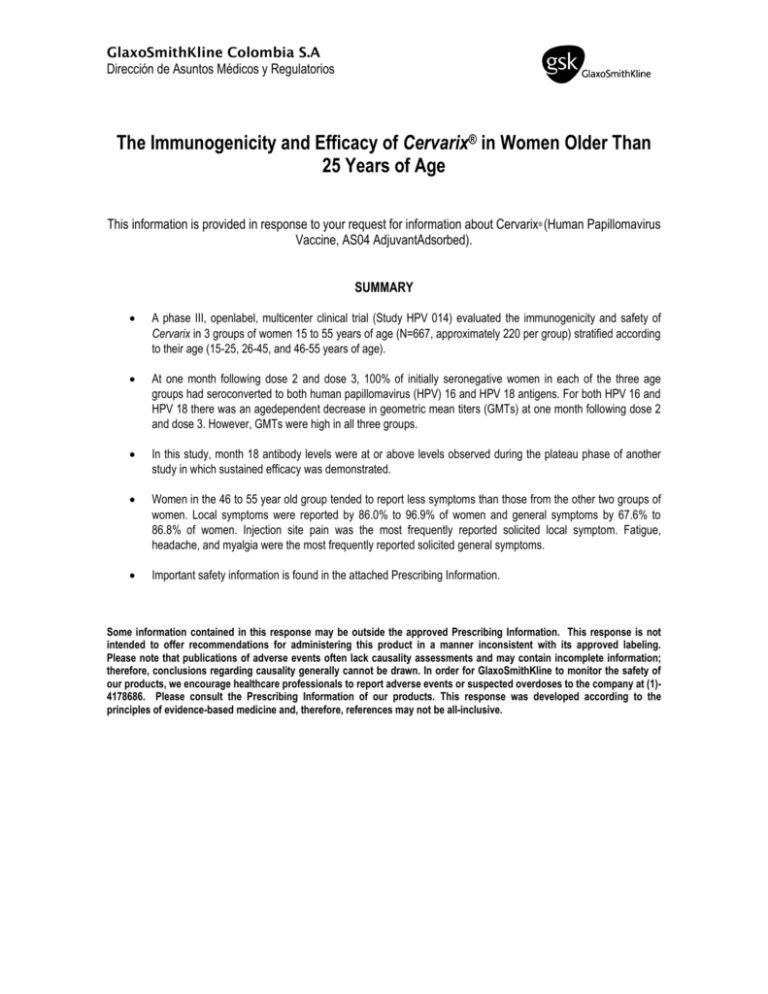
GlaxoSmithKline Colombia S.A Dirección de Asuntos Médicos y Regulatorios The Immunogenicity and Efficacy of Cervarix® in Women Older Than 25 Years of Age This information is provided in response to your request for information about Cervarix® (Human Papillomavirus Vaccine, AS04 AdjuvantAdsorbed). SUMMARY A phase III, openlabel, multicenter clinical trial (Study HPV 014) evaluated the immunogenicity and safety of Cervarix in 3 groups of women 15 to 55 years of age (N=667, approximately 220 per group) stratified according to their age (15-25, 26-45, and 46-55 years of age). At one month following dose 2 and dose 3, 100% of initially seronegative women in each of the three age groups had seroconverted to both human papillomavirus (HPV) 16 and HPV 18 antigens. For both HPV 16 and HPV 18 there was an agedependent decrease in geometric mean titers (GMTs) at one month following dose 2 and dose 3. However, GMTs were high in all three groups. In this study, month 18 antibody levels were at or above levels observed during the plateau phase of another study in which sustained efficacy was demonstrated. Women in the 46 to 55 year old group tended to report less symptoms than those from the other two groups of women. Local symptoms were reported by 86.0% to 96.9% of women and general symptoms by 67.6% to 86.8% of women. Injection site pain was the most frequently reported solicited local symptom. Fatigue, headache, and myalgia were the most frequently reported solicited general symptoms. Important safety information is found in the attached Prescribing Information. Some information contained in this response may be outside the approved Prescribing Information. This response is not intended to offer recommendations for administering this product in a manner inconsistent with its approved labeling. Please note that publications of adverse events often lack causality assessments and may contain incomplete information; therefore, conclusions regarding causality generally cannot be drawn. In order for GlaxoSmithKline to monitor the safety of our products, we encourage healthcare professionals to report adverse events or suspected overdoses to the company at (1)4178686. Please consult the Prescribing Information of our products. This response was developed according to the principles of evidence-based medicine and, therefore, references may not be all-inclusive. GlaxoSmithKline Colombia S.A Dirección de Asuntos Médicos y Regulatorios Clinical study data A phase III, open-label, multicenter clinical trial (Study HPV 014) evaluated the immunogenicity and safety of Cervarix in 3 parallel groups of women 15 to 55 years of age (N=667, approximately 220 per group) stratified according to their age (1525, 2645, and 4655 years of age).(1) This study was conducted in Germany and Poland. Cervarix was administered intramuscularly on a 0, 1, and 6 month schedule to all women. Blood samples were scheduled to be collected at months 0, 2, 7 and 12. Blood samples were evaluated for HPV 16 and HPV 18 antibodies using a type specific enzyme linked immunosorbent assay (ELISA). The primary objective of this study was to demonstrate non-inferiority of the immune response, with respect to seroconversion rates, to Cervarix at month 7 between women 15 to 25 years of age and women 26 to 45 years of age. A secondary objective of this study was to demonstrate noninferiority of the immune response, with respect to seroconversion rates, to Cervarix at month 7 between women 15 to 25 years of age and women 46 to 55 years of age. At one month following dose 2 and dose 3, 100% of initially seronegative women in each of the three age groups had seroconverted to both HPV 16 and HPV 18 antigens. For both HPV 16 and HPV 18 there was an agedependent decrease in GMTs at one month following dose 2 and dose 3. However, GMTs were high in all three groups. The GMTs for anti-HPV 16 and anti-HPV 18 antibodies in initially seronegative women for all 3 groups are listed in Table 1. As part of normal aging, immune response to vaccination declines with age.(2) In this study, month 18 antibody levels were at or above levels observed during the plateau phase of another study (HPV 007) in which sustained efficacy was demonstrated.(3) Anti-HPV 16 and anti-HPV 18 levels are presented in Figure 1 and Figure 2. GlaxoSmithKline Colombia S.A Dirección de Asuntos Médicos y Regulatorios Women in the 46 to 55 year old group tended to report less symptoms than those from the other two groups of women.(1) Local symptoms were reported by 86.0% to 96.9% of women and general symptoms by 67.6% to 86.8% of women. Overall, grade 3 solicited symptoms were reported after 4.4% to 6.6% of doses. No major differences were noted between the three doses. The percentage of women reporting grade 3 solicited symptoms was about the same in the three age groups (12.1% to 15.0%). Injection site pain was the most frequently reported solicited local symptom (reported after 62.8% to 83.9% of doses). Grade 3 pain was reported after 1.6% to 4.5% of doses. Redness at the injection site was reported by 48.8% to 58.6% of women after 31.8% to 36.7% of doses. Grade 3 redness (>50 mm) was reported after 0% to 1.0% of doses. Injection site swelling was reported by 40.1% to 44.2% of women after 22.5% to 27.4% of doses. Grade 3 swelling (>50 mm) was reported after 0.3% to 0.6% of doses. Overall, the mean number of days with local symptoms, during the solicited post vaccination period, varied between 2.8 to 3.6 days. Fatigue, headache, and myalgia were the most frequently reported solicited general symptoms. Overall, the mean number of days with general symptoms, during the solicited post vaccination period, varied between 1.5 to 2.6 days. Fatigue was reported by 39.1% to 56.4% of women. Grade 3 related fatigue was reported by 0.4% to 1.3% of women. Headache was reported by 39.6% to 54.2% of women. Grade 3 related headache was reported by 0.4% to 2.2% of women. Myalgia was reported by 40.1% to 55.5% of women. Grade 3 related myalgia was reported by 0% to 3.1% of women. No major differences were noted as a function of dose in the three age groups. Overall, six serious adverse events were reported by six women. One woman withdrew from the study due to a serious GlaxoSmithKline Colombia S.A Dirección de Asuntos Médicos y Regulatorios adverse event and three women withdrew from the study due to non-serious adverse events. No deaths were reported during the study. GlaxoSmithKline Colombia S.A Dirección de Asuntos Médicos y Regulatorios References 1. Data on File. Study 103514 (HPV 014). 2006. 2. Gardner P, Pabbatureddy S. Vaccines for women age 50 and older. Emerg Infect Dis 2004;10:19901995. 3. Harper DM, Franco EL, Wheeler CM, et al. Sustained efficacy up to 4.5 years of a bivalent L1 virus-like particle vaccine against human papillomavirus types 16 and 18: follow-up from a randomized control trial. Lancet 2006;367:12471255.*

